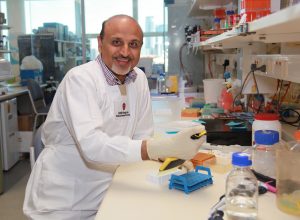
Professor Rajiv Khanna, QIMR
Autologous adoptive T-cell therapy has been successfully used to fight recurrent or drug-resistant cytomegalovirus (CMV) infections in recipients of solid organ transplants.
The phase 1 clinical trial, led by the QIMR Centre for Immunotherapy and Vaccine Development, treated 13 patients with in vitro-expanded autologous CMV-specific T cells.
Patients, from the Princess Alexandra and Prince Charles Hospitals in Brisbane and the Royal Adelaide Hospital, included recipients of kidney, lung and heart transplants.
QIMR’s Professor Rajiv Khanna said eleven of the 13 patients showed improvement in symptoms, including complete resolution or reduction in DNAemia or CMV-associated end organ disease.
Some patients were able to reduce or stop taking anti-viral medication altogether.
Furthermore, many of these patients showed co-incident increased frequency of CMV-specific T cells in peripheral blood following completion of T-cell therapy.
“We were also very happy to see no side effects – no damage to the transplanted organ,” he told the limbic.
Professor Khanna predicted the immunotherapy would also be applicable to recipients of other organs such as the liver.
And he is planning to expand the targets to include other opportunistic viruses such as Epstein-Barr, BK polyomarvirus in renal transplant patients, and adenoviruses in paediatric patients.